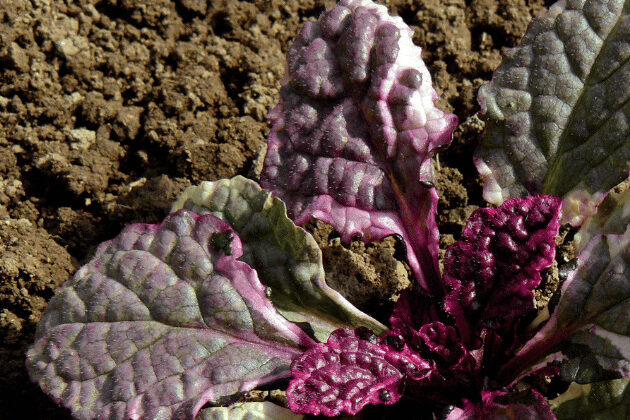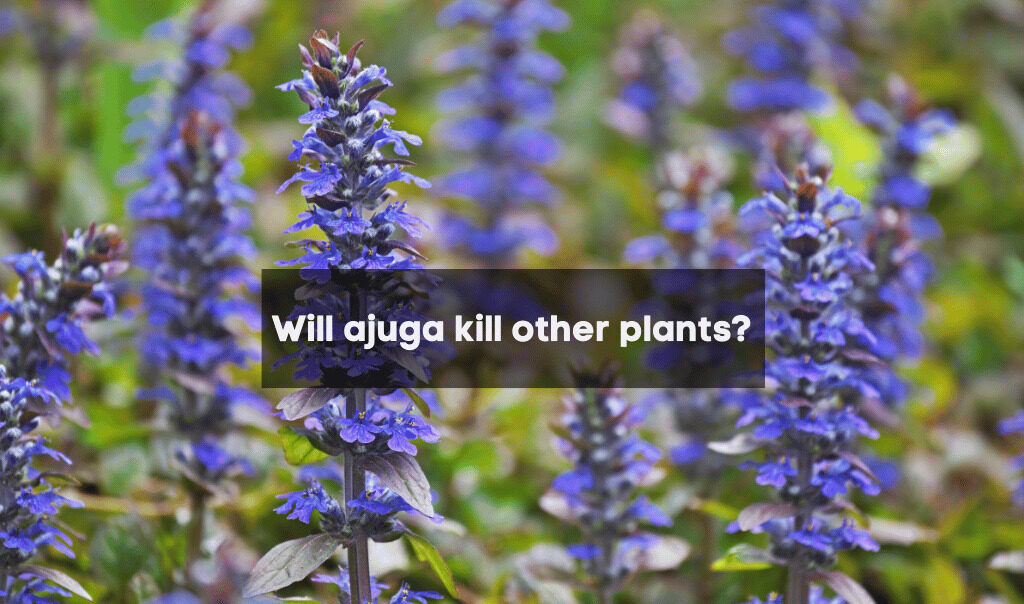Ajuga is a versatile groundcover that has gained popularity for its low-maintenance and fast-growing nature. Still, some gardeners have raised concerns about whether it can harm other plants.
This comprehensive guide will explore the factors determining Ajuga’s impact on other plants and provide practical tips for minimizing any adverse effects.
So, whether you’re a seasoned green thumb or just starting to build your Garden, join me as we uncover the truth about Ajuga and its potential to kill other plants.
Ajuga’s Growth and Spread Habits
Ajuga is a low-maintenance plant that thrives in most soils but prefers well-drained, moist soil in partial to full shade. Its growth habit is prostrate, which spreads horizontally along the ground and forms a dense mat of leaves.
This makes it an excellent choice for ground cover in areas where you want to reduce weeds and prevent erosion.
Will ajuga kill other plants?
No, ajuga (bugleweed) is unlikely to directly kill other plants. However, it can be aggressive and compete with other plants for resources like water, nutrients, and light.
It can also release chemicals into the soil that may inhibit the growth of other plants, although it is not a strong allelopathic plant.
Therefore, it’s important to plant ajuga at an appropriate distance from other plants to avoid competition and monitor its growth regularly.
It can crowd out and choke other plants, blocking light and causing them to die. To avoid these issues, it is essential to manage Ajuga’s growth by planting it in a contained area or using edging materials and pruning regularly.
Different Varieties of Ajuga With Their Impact on Other Plants
Ajuga, also known as Bugleweed, is a popular groundcover plant prized for its fast growth and spreading habits. There are many varieties of Ajuga, each with its unique foliage and flower colors, as well as growth habits.
Some types of Ajuga are more aggressive and have a more significant impact on other plants, while others are more contained and less likely to harm other plants.
Here are some of the most popular varieties of Ajuga and their impact on other plants:
Ajuga reptans ‘Catlins Giant’
This variety is a fast grower and has larger leaves and taller spikes of blue flowers compared to other types. It is less likely to harm other plants, but still needs to be managed to prevent it from crowding out other plants.
Ajuga reptans ‘Black Scallop’
This variety is a slow grower with dark, shiny leaves and blue flowers. Its growth habit is less aggressive, making it less likely to harm other plants.
Ajuga reptans ‘Burgundy Glow’
This variety has metallic-looking leaves that are burgundy in color. It is more contained and less likely to harm other plants.
How does Ajuga Affect Other Plants in the Garden?
Ajuga provides a dense cover that can suppress weeds and retain moisture in the soil, which can benefit other plants.
On the other hand, its rapid growth and spread can lead to the crowding and choking of different plants and competition for water and nutrients.
To prevent adverse effects, managing Ajuga’s growth and spread and choosing companion plants that can thrive alongside it is essential.
Learn More: What kills Coccidia in the yard?
How to Choose the Right Location for Ajuga in Your Garden?
When it comes to choosing the right location for Ajuga in your Garden, there are a few key factors to consider:
- Ajuga prefers partial to full shade, so finding a spot that gets shade throughout the day is essential.
- Ajuga does best in moist, well-drained soil, so finding a spot that won’t become waterlogged is essential.
- Ajuga is a low-growing plant, so it’s essential to find a spot that taller plants won’t overshadow.
Once you’ve found the perfect spot, you can enjoy Ajuga’s beautiful foliage and flowers in your Garden.

Factors that Determine the Impact of Ajuga
Ajuga, also known as Bugleweed, is a low-growing, evergreen perennial plant that is often used as a ground cover in gardens.
Its attractive foliage and flowers make it a popular choice for landscaping, but its impact on a garden can vary depending on several factors.
Climate: Ajuga prefers relaxed, moist environments and will not thrive in hot, dry climates. It is hardy in USDA zones 3-9, so if you live in warmer weather, you may need to provide extra water and shade to keep your Ajuga healthy.
Soil: Ajuga prefers moist, well-drained soil with a pH of 6.0-7.5. If your soil is too acidic or alkaline, you may need to amend it with compost or other soil amendments to make it more suitable for Ajuga.
Light: Ajuga prefers partial shade but can tolerate full sun with adequate moisture. If your Garden is in full sun, you may need to provide extra water to keep your Ajuga healthy.
Maintenance: Ajuga is a low-maintenance plant, but it does require regular pruning to keep it looking its best.
Pruning should be done in the spring and fall to remove dead or damaged foliage and to keep the plant from spreading too quickly.
These are the main factors determining Ajuga’s impact on your Garden. By taking the time to understand the needs of your Ajuga and providing the right environment, you can ensure that your Ajuga will thrive and provide you with a beautiful, low-maintenance ground cover.
Tips for Minimizing the Negative Effects of Ajuga on Other Plants
Minimizing the adverse effects of Ajuga on other plants can be achieved by following a few simple steps.
- Plant Ajuga in an area that is isolated from other plants. This will help to reduce the spread of Ajuga’s aggressive growth habit.
- Prune Ajuga regularly to keep it from spreading. This will also help to keep the plant from taking over other plants in the area.
- Use mulch around the Ajuga to help keep the soil moist and reduce the spread of the Ajuga’s roots.
- Plant Ajuga in a container or raised bed to help contain its growth.
- Use a weed barrier to help prevent the Ajuga from spreading to other areas.
Following these simple steps can help minimize Ajuga’s adverse effects on other plants in your Garden.
Frequently Asked Questions (FAQ)
Q: Can Ajuga kill other plants?
A: Yes, Ajuga can be invasive and kill other plants if left unchecked.
Q: How does Ajuga kill other plants?
A: Ajuga can spread rapidly and choke out other plants by competing for light, water, and nutrients.
Q: What other plants can Ajuga kill?
A: Ajuga can kill other plants, including grasses, shrubs, and trees.
Q: How can I prevent Ajuga from killing other plants?
A: To prevent Ajuga from killing other plants, keeping it contained and regularly removing any excess growth is essential.
Q: Is Ajuga considered an invasive species?
A: Yes, Ajuga is considered an invasive species in many areas.
Q: How can I control Ajuga’s growth?
A: To control Ajuga growth, it is essential to remove any excess growth and keep it contained regularly.
Q: What should I do if Ajuga is killing other plants?
A: If Ajuga is killing other plants, it is essential to remove excess growth and keep it contained to prevent further spread.
Q: Is Ajuga toxic to other plants?
A: No, Ajuga is not toxic to other plants, but it can spread rapidly and choke out other plants by competing for resources.
Q: How quickly can Ajuga spread?
A: Ajuga can spread quickly, so it is essential to keep it contained and regularly remove any excess growth.
Q: Is Ajuga a threat to native plants?
A: Yes, Ajuga can threaten native plants if left unchecked.
Final Word
In conclusion, Ajuga can harm other plants in the Garden if not planted correctly. It spreads rapidly and prefers moist, well-drained soil, which can lead to competition for nutrients and water with other plants.
To prevent this, it’s essential to give Ajuga enough space to grow and to choose a location that offers the right light and soil conditions for its growth. With proper care and attention, Ajuga can coexist peacefully with other plants in your Garden.

